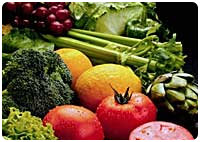|

Vision & Your Health
In 2001, approximately 244,766 cataract operations were performed in Canada.
Prevention Tips
Certain lifestyle habits may help slow cataract development, though there is no proven method to prevent them.
- Don't smoke.
- Decreases your eyes' exposure to ultraviolet light by as much as 50%. You can do this by wearing a hat or sunglasses when you are in the sun and avoiding sunlamps and tanning booths.
- Eat a diet rich in vitamins C and E.
- Limit your alcohol intake.
- Avoid the use of steroid medications when possible.
- Keep high blood pressure and diabetes under control.
Diet
 Foods rich in flavonoids, the amino acid glutathione, antioxidants, and other nutrients found in natural foods support flexible lenses and the health of the retinal area. Foods rich in flavonoids, the amino acid glutathione, antioxidants, and other nutrients found in natural foods support flexible lenses and the health of the retinal area.
Carotenes, a class of natural fat-soluble pigments found principally in plants, lutein [loo-teen] and zeaxanthin [zee-uh-zan-thin], are antioxidants and may protect against cataracts and AMD.
Studies in which diet was compared to the risk for developing AMD, found a significantly lower risk for developing an eye disease in people with high amounts of lutein and zeaxanthin in their blood. Those people eating a diet with the most lutein and zeaxanthin (as much as 5.8 milligrams (mg) per day) had a significantly lower risk for AMD than those whose diet contained the least amount (as low as 1.2 mg per day). Dietary studies confirmed the association between frequent consumption of spinach or collard greens, particularly good sources of lutein and zeaxanthin, and lower AMD risk.
Foods that are good for you & your vision
- Eggs
- Fresh fruits
- Dark red & green vegetables
- Berries & nuts
- Seafood
The best fruit sources for protecting eyes from free radical damage are: prunes, raisins and blueberries. For vegetables: kale, raw spinach and Brussels sprouts.
|